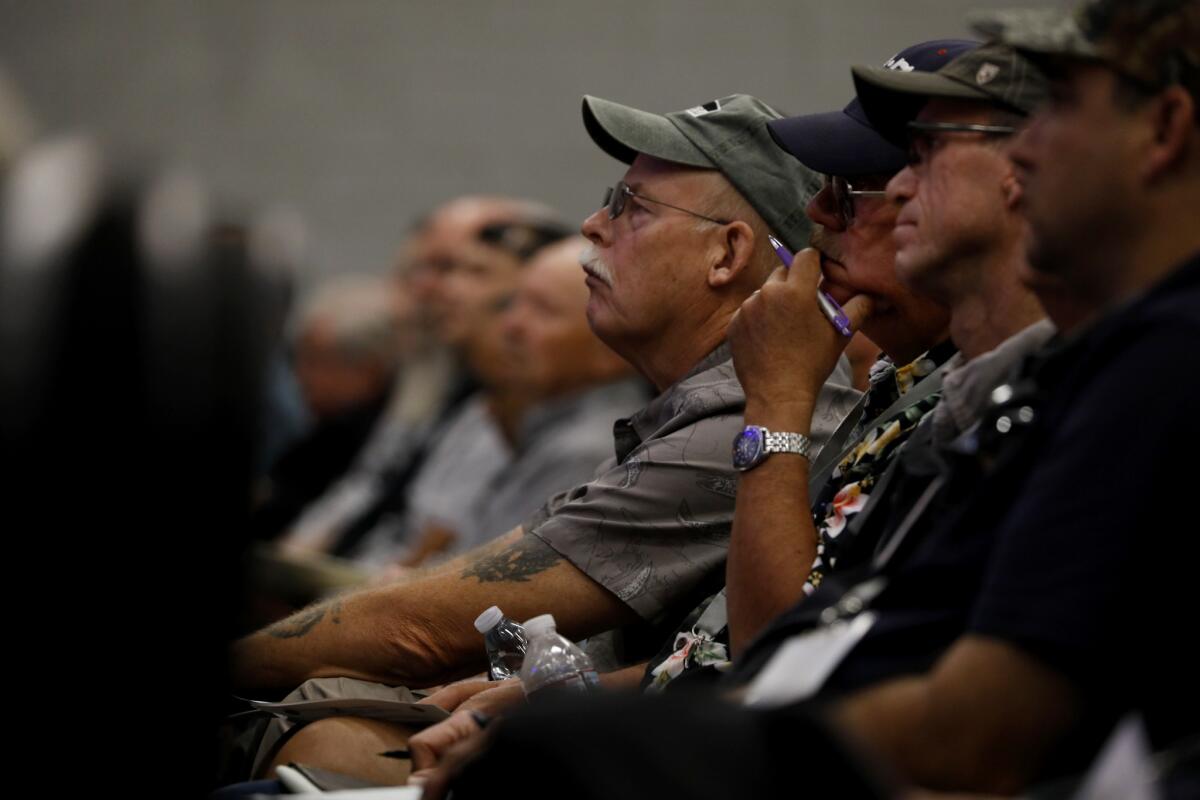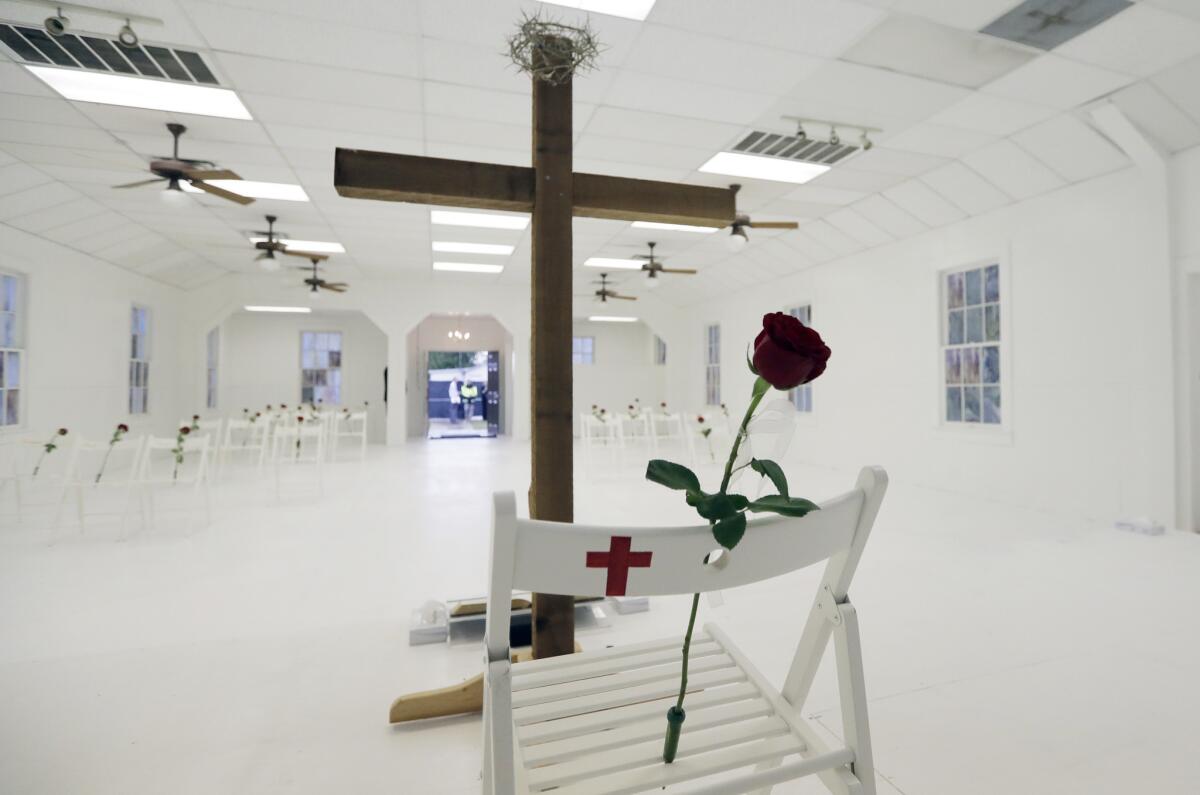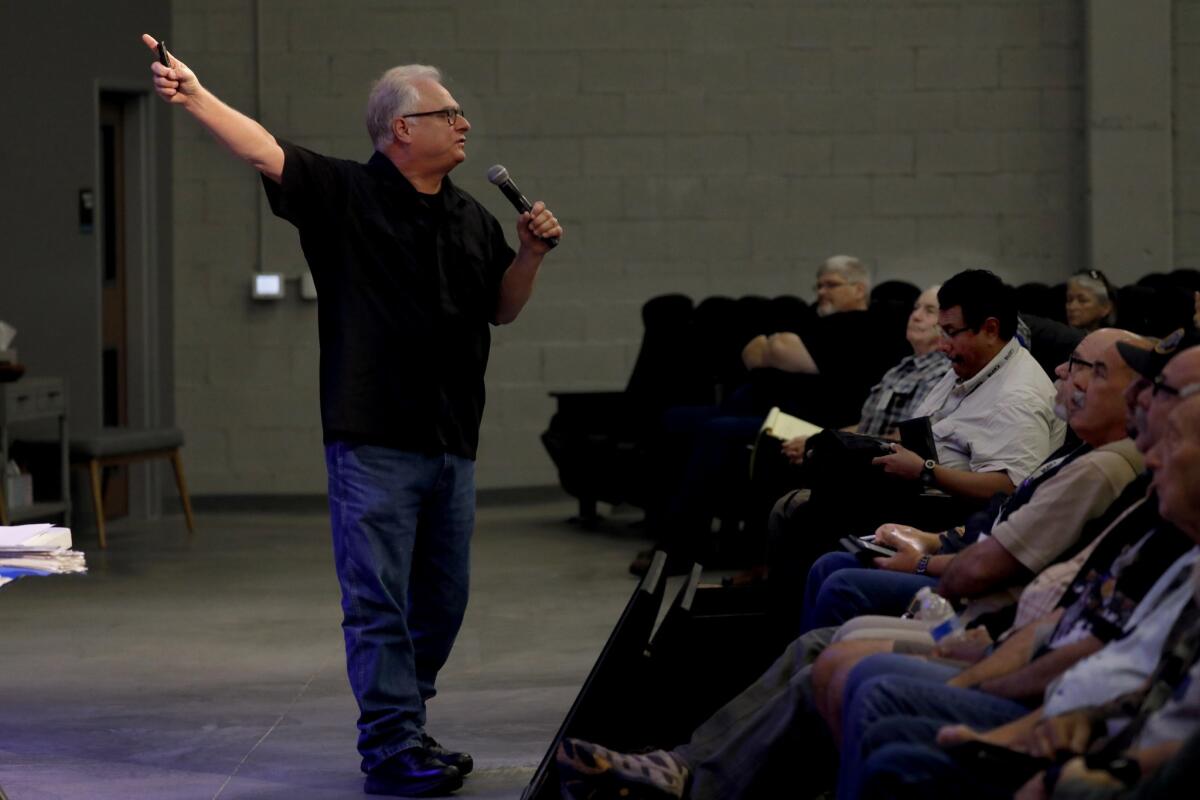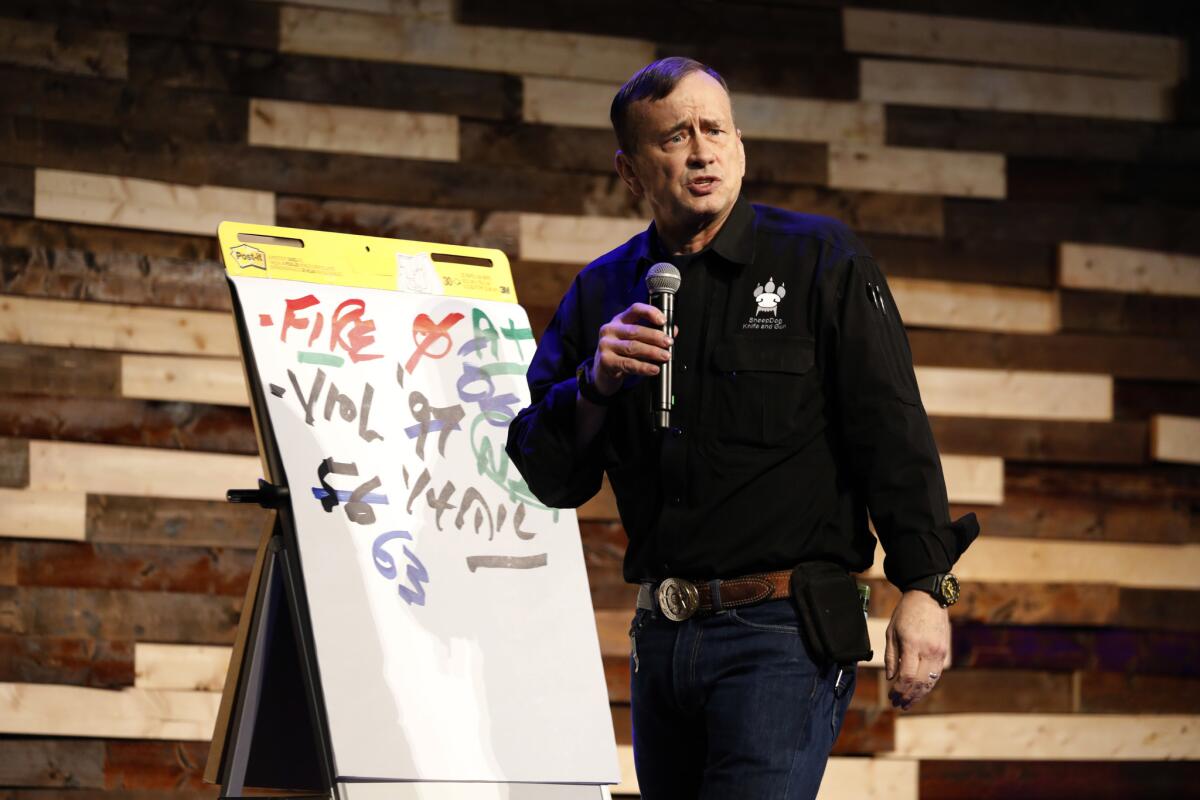At a church security seminar: Guns, God and ‘get those heads up’ when you pray

- Share via
Just as the people in Mariners Church began to pull off their hats, bow their heads and close their eyes to pray, Jimmy Meeks snapped at them.
“Get those heads up!” said the pastor and retired Texas police officer.
Hadn’t he just warned them that closing their eyes made them targets? Sheep in the presence of wolves.
“What’s wrong with y’all?”
Their eyes duly peeled, he then led the crowd in a prayer.
“Wherever we are, Father, should the wolf cross our path, give us the wisdom to know what to do with that moment, and give us the power and the courage to act to stop the wolf and protect our sons and daughters.”
Churchgoers, preachers and law enforcement officers from across Southern California had gathered for a church security seminar in Huntington Beach hosted by the California Rifle & Pistol Assn., which delivered a warning: Faith alone will not protect you in a house of God.
In the sleek sanctuary of Mariners Church, the mostly male crowd sipped coffee, jotted notes and punctured the air with shouts of “Amen!” and “Hooah!” as a series of out-of-town speakers at the Sheepdog Seminar encouraged them to be the ones who step up and protect others if, God forbid, an attacker comes.
Get those heads up! What’s wrong with y’all?
— Jimmy Meeks, pastor and retired police officer who runs Sheepdog Seminars
In the months since a gunman in November killed 26 people at the First Baptist Church in rural Sutherland Springs, Texas, many people of faith have begun questioning how to keep religious institutions safe, said Rick Travis, executive director of the California Rifle & Pistol Assn. His organization has been inundated with requests for church security training and probably will be hosting events for the next several years, he said.
“We don’t want people to be afraid,” said Travis, a churchgoer himself. “We want people to be knowledgeable.”
The seminar happened four days before a mass shooting at Santa Fe High School in Texas killed 10 people, mostly students, and reignited the never-ending debate over gun control, the 2nd Amendment and the place of firearms in American society.
Appearing on Sunday morning news programs, Texas Lt. Gov. Dan Patrick said that teachers need to be armed. He said guns are not the problem.
“Guns stop crimes,” he said on ABC’s “This Week.” “If we take the guns out of society — if you or anyone else thinks that that makes us safer, then I’m sad to say that you’re mistaken. That will just give those that are evil … [the ability] to put more of us in danger.”
Were the assembled at the church safety event being told to pack heat in the pews? Not always in so many words — and that wasn’t the whole kit and caboodle of advice. But if you’re legally able to carry a gun, the speakers said, it’s best to do it.
“If you do not have an armed presence in your church, you are simply not ready,” Meeks said.
If, at times, the speakers were a little circumspect about telling people to carry a weapon, there was a reason.
California has some of the strictest gun laws in the country — and there is overwhelming support for keeping it that way.
Meeks, a self-deprecating man whose voice ranged from the fiery yell of a preacher at an old-fashioned tent revival to a subdued, choked-up whisper, began the eight-hour, $75 seminar with a playful jab at the Golden State.
“Wow, it’s good to be here,” Meeks said. “It’s not often we get to do a Sheepdog Seminar in a foreign country.”
We don’t want people to be afraid. We want people to be knowledgeable.
— Rick Travis, executive director, California Rifle & Pistol Assn.
Many at the seminar said they were disturbed because the Sutherland Springs shooting, the deadliest church massacre in modern American history, seemed to quickly fade from the national news cycle, especially compared with recent school shootings.
Travis said he was alarmed by another incident on the same day as the Sutherland Springs attack. That morning, a man fatally shot his estranged wife and her new boyfriend in the parking lot of St. Alphonsus Church in Fresno before committing suicide. The Fresno shooting was eclipsed by the larger killing in Texas and received scant attention outside the city.
“I thought, wow, how often does this happen in California and we just don’t know about it?” Travis said.
Statistically, it’s exceedingly safe to go to church on Sunday morning, said Dallas Drake, a criminologist at the Center for Homicide Research in Minneapolis. There is such a vast number of American churches that the number of violent incidents is small.
“It’s such an affront to our moral sensibilities that someone would even bring a firearm into a church,” Drake said. “It really crosses a line that we cannot deal with. We don’t want to see a gun in church. This is a place where we come for peace and solace.”
Drake and other researchers compiled a database of church shootings from 1980 to 2005 and found 139 incidents, an average of 5.5 per year. But the annual rate doubled in ensuing years.
The Center for Homicide Research has documented 146 shootings from 2006 to 2016, an average of 11 per year, Drake said. Nearly half of the shooters have some connection to the church. (The data include only Christian churches, not other houses of worship such as mosques or synagogues, and are limited to shootings.)
There is very little research about violence at faith-based properties, Drake said. He added that he is concerned by the number of paid church safety trainings he sees and worries that people will take advantage of those who are afraid.
Carl Chinn, a speaker at the Sheepdog Seminar and a Colorado-based security consultant, maintains an extensive database on a broader range of violent acts at all types of American religious institutions. Chinn tracked 1,705 “deadly force incidents” — including abductions and suicides — from January 1999 through December 2017. About 1,000 involved a gun.
In the Huntington Beach sanctuary, Meeks asked the crowd, “Faith without works is what?”
“Dead!” they yelled back, completing the Bible verse with the same words.
“And you might be, too, if you don’t have a plan.”

In the Orange County city of 200,000 people, the Sheepdog Seminar speakers found a place in Southern California that was not entirely opposed to the gun-friendly ideas they were espousing.
Earlier this year, a Huntington Beach resident circulated a proposed initiative, trying to get it on the city’s November election ballot, that would make the possession and sale of semiautomatic and automatic guns a felony. The city responded by suing him, saying the petition was unconstitutional.
But despite pockets of conservatism, California is a state that remains at the forefront of gun control.
Meeks travels around the country conducting Sheepdog Seminars, calling on congregants to prepare for violent attacks.
“One of the faultiest beliefs among Christian people is this: Faith is enough to protect us from harm. That’s not true,” Meeks said. “Jesus said the rain falls on the just and the unjust … To tell me faith is enough to protect? Read your Bible. It doesn’t say that.”
Attendees said it can be awkward discussing security in houses of worship because they pride themselves on welcoming all. Some of the strongest pushback comes from the faithful themselves, said Rabbi Yossi Eilfort, of West Hollywood, who runs a security company in Irvine.
“People need to be prepared, rationally, practically thinking, how do we keep our people safe even though we’re trying to open the doors to everybody?” said Eilfort, an Orthodox rabbi who has trained in mixed martial arts.
“We don’t want to turn people away. The homeless need the help the most. But at the same time, we can’t rely solely on faith to say things are going to be OK. That’d be like shutting off the fire sprinkler systems.”
Pray, plan, prepare.
— Robert Schroeder
Robert Slade, 81, of Kern County, said he spends each Sunday morning in the foyer of his Pentecostal Foursquare church with his cup of coffee. He greets and studies everyone who comes in to see if they pose a threat. Strangers get a little more attention.
“We all know churches are soft targets,” said Slade, who paid for a church usher to join him at the seminar.
Robert Schroeder, 62, a member of a Nazarene church in Whittier, said a thought came to him during the training: “Pray, plan, prepare.”
A retired longtime Huntington Beach police officer said his Orange County church decided to form a security team a few years ago after a drunken man on parole ran down the aisle toward the pastor, swearing at him. The retired officer helped tackle him.
The security team now has about 17 members, including many current and retired law enforcement officers who, under federal law, can carry concealed weapons. They sit in strategic locations throughout the sanctuary.
“People initially thought it was a joke. Why do we need church security?” said the retired officer, who did not give his name because he didn’t want potential attackers to be able to identify him. “But minds have changed.”

In the sanctuary, Meeks insisted most attackers are hot-tempered people — like those going through a divorce or who lost their job — who are neither mentally ill nor foreign terrorists.
“You’ve got people in your church who are ticking time bombs … A bullet from a Methodist is going to hurt just as much as a bullet from a Muslim,” he said.
Dave Grossman, a retired Army lieutenant colonel and police trainer who attended President Trump’s roundtable on violent video games in the wake of the February school shooting in Parkland, Fla., laid much of the blame for mass killings on television shows, movies and video games that are creating “sick, sick people.” He said the news media do not adequately report on mass killings in other countries and that reporters are trying to “brainwash” people.
“Words have power, do you understand?” he said. “It’s anti-gun propaganda every time we call a criminal act a shooting.”
As the day wound on, Grossman and Meeks gave the audience tips for keeping their churches safe: Lock the door. Greet and study every person who enters. Watch the parking lot. Have Sunday school and day-care teachers carry pepper spray. Teach people to throw projectiles at attackers.
Meeks lingered over projected photos from Emanuel African Methodist Episcopal Church in Charleston, S.C., where Dylann Roof, a white supremacist, fatally shot nine black congregants in a Bible study class in 2015.
Roof didn’t start shooting, he said, until the parishioners closed their eyes in prayer.

Twitter: @haileybranson
More to Read
Sign up for Essential California
The most important California stories and recommendations in your inbox every morning.
You may occasionally receive promotional content from the Los Angeles Times.














